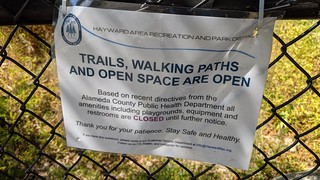Back in May, two months into shelter in place, I wrote about the frustration plaguing our communities. We were told to stay home until authorities figured out how to handle the pandemic, and then were given very little direction as to what to expect. People put their lives on hold, were put into impossible positions of not knowing how they’d feed their families in the coming months, and generally being demoralized (or worse) by the sudden shutdown.
Even as someone who is well-informed and doesn’t watch live TV (no hype from the 24-hour news networks for me!), I struggled with understanding what we were waiting for too. Our society and economy is not set up to absorb months of closures and mass unemployment. Even as it is, it’s going to take our country years to recover, and the situation is even more dire and personal for the most economically vulnerable among us. In the end, I’ve been cautious about the partisan narrative on either side, and have focused on what we’re hearing from respected scientists and doctors. This has included regular updates from Chair of UCSF Department of Medicine, Dr. Robert M. Wachter. His updates via Twitter and articles like the one that recently appeared in The Atlantic, Vigilance Had a Three-Month Shelf Life, provided perspective, sympathy and understanding, and science.
Through all of this, I learned what these four months have bought us: time for hospitals to prepare in terms of Personal Protective Equipment (PPE) and other equipment, as well as space and additional preparedness training, time for the public to prepare with their own PPE, discovery of some current drugs on the market that help with treatment, and improvements with testing, contact tracing, and general monitoring. Plus, we learned from studies and other countries that successfully reduced the spread, that cloth masks and physical distancing work. This is all incredibly important. Our time at home was not totally wasted. We are not back at square one. We’re all learning and trying to cope, and it’s hard for everyone. One of the things I enjoy about Dr. Wachter’s posts is that he has tremendous empathy and understanding of human nature. My family is doing as well as can be expected, but even we have hard days and just wish this was over.
I am tiring of the conspiracy theories being thrown around by some of my fellow citizens though. I’m definitely a liberal, but I agree with my conservative relatives on several things, just not the conclusions they draw from it. I agree that we shouldn’t blindly follow government mandates like mask-wearing, and that it’s a slippery slope to becoming accustom to it, but I don’t believe the government is actually conditioning us for that. For one, I don’t think they’re together enough to orchestrate such a plan, and secondly, I believe what the evidence is showing us from other countries, I’m not blindly following anything. I agree that a cashless society is dangerous, but I believe businesses are going that route temporarily due to safety concerns for their employees and logistics (there is a coin shortage due to production ceasing). And as I began this post with, I’m deeply concerned about the economic impact this is having on people who don’t have the luxury of working from home, but I don’t think the answer is to open everything up and just let people get sick and die, I believe this is where the government should be stepping in to help expand unemployment and other benefits. It’s going to be expensive and it will take us years to dig ourselves out economically, but COVID-19 is not just going to disappear, and more of us will be alive at the end if we’re cautious and the government steps in to help those in need.
How we move forward is going to be up to us. I’m devastated that the pandemic hit at this point in our history, when science literacy is down and partisanship is up. As I mentioned in the post from May, things that should never have been made political were made so. A misunderstanding of the scientific process meant that people became distrustful of the very organizations tasked with our safety as their recommendations evolved with the evidence. I was grateful when our president finally got on board this week with mask-wearing, and I hope that it will help some of the more reluctant members of his party change their minds as well. Continuing to ignore it is only going to lead to more tragedy. We all need to be doing our part to take this seriously until treatment improves to an acceptable level and ultimately there is a safe vaccine.


